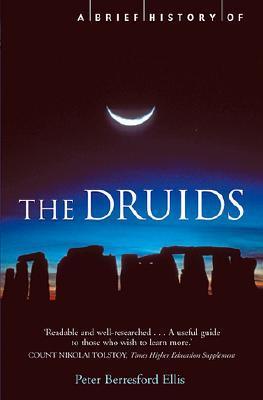
A Brief History of the Druids
Book Description
Ancient whispers echo through the misty woods of Europe, revealing a world where wisdom and power intermingled in sacred rituals. "A Brief History of the Druids" dissects the enigmatic past of these legendary figures, unearthing their profound influence on society, religion, and the very fabric of culture. With gripping tales that span centuries, Peter Berresford Ellis illuminates the Druids' struggles against political upheavals and religious transformation. As their secrets unfold, questions arise: Were they the guardians of knowledge or mere pawns in a fading world? Dive into the mystery that remains—what truths still lie hidden beneath the stones of time?
Quick Book Summary
"A Brief History of the Druids" by Peter Berresford Ellis is a meticulous exploration of the ancient priestly class known as the Druids, who played vital roles in Celtic societies across Europe. Ellis draws from archaeological discoveries, classical accounts, and folk traditions to untangle fact from myth, investigating the historical realities behind Druidic practices and beliefs. Through examining their roles as judges, teachers, healers, and religious leaders, the book explains how Druids shaped cultural and spiritual life. The narrative also addresses the decline of the Druids amid Roman occupation and the rise of Christianity. Ultimately, Ellis confronts both the allure and the distortion surrounding the Druids, encouraging readers to reconsider the complexities of their legacy and the enduring fascination they exert within modern spiritual and historical imagination.
Summary of Key Ideas
Table of Contents
The Origins and Roles of the Druids
Ellis begins his account by tracing the mysterious origins of the Druids, situating them within the context of ancient Celtic culture that spanned Britain, Ireland, and continental Europe. He explains how the earliest references to Druids come from Greek and Roman writers, who were both fascinated and perplexed by these priestly figures. While much of their written history was lost due to the Druids’ oral tradition, Ellis reconstructs their societal emergence, highlighting their evolution from tribal magicians and wise men to vital social leaders who mediated between the physical and spiritual worlds.
Sources: Separating Fact from Myth
A core tension in the study of the Druids is the difficulty of separating historical fact from romanticized myth. Ellis carefully analyzes classical sources like Julius Caesar’s "Commentaries on the Gallic War," noting the biases and limited perspectives of such accounts. He cross-examines these with archaeological evidence, folklore, and later literary traditions, exposing where Victorian era romanticism and modern neopaganism have embellished or misunderstood the real Druids. This section challenges persistent misconceptions, such as human sacrifice, and presents a more nuanced image grounded in available scholarship.
Druids and Celtic Society
Druids held multifaceted roles within Celtic society, acting not only as religious officiants, but also as judges, teachers, diplomats, and healers. Ellis describes their function in maintaining societal order through lawmaking and mediation, their educational system involving years of memorization and training, and their expertise in natural philosophy and healing. The Druids’ influence extended to the calendrical rituals, the selection of kings, and the preservation of tradition, positioning them as intellectual elite whose power rivaled that of the warriors and chieftains.
The Decline and Transformation of Druidism
The decline of Druidism was precipitated primarily by Roman conquest and later by the spread of Christianity. Ellis describes the systematic efforts by Roman authorities to suppress Druidic practices, viewing them as potential sources of resistance. Over time, assimilation into Christian structures or outright eradication of their customs diminished Druidic visibility. Yet, traces of their practices persisted, often syncretized within Christian festivals or local customs, bearing witness to the resilience and adaptability of the Druidic tradition.
The Enduring Legacy and Modern Perceptions
In closing, Ellis explores the modern legacy of the Druids, acknowledging their place in contemporary spirituality and cultural revival movements. He explains how the scarcity of reliable historical records allowed the Druids to become symbols of both romanticized pagan wisdom and nationalist identity. The allure of Druidic mysteries continues to inspire literature, neopagan religions, and historical research, making their story both a cautionary tale against historical distortion and a testament to humanity’s enduring longing for connection with the ancient past.
Download This Summary
Get a free PDF of this summary instantly — no email required.





